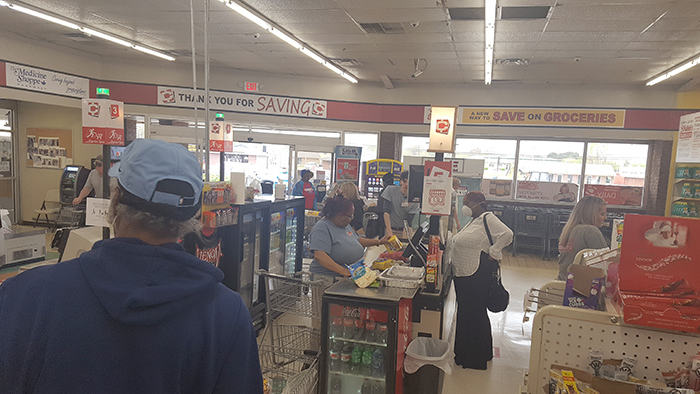
[metaslider id=4968]
For approximately 10 days, starting March 13, employees at Naifeh’s Cash Saver in Covington and Naifeh’s Food Market in Munford were kind of like the undead.
“We went home like zombies at night and woke up like zombies,” said Judson Naifeh, who owns both stores. “It was incredible. We gave the best service we could give with the worst conditions.”
That was when most Tipton County residents, and people across the country, began to realize the seriousness and repercussions of coronavirus. Grocery stores like Naifeh’s, Kroger, Walmart and Save A Lot were basically out of toilet paper. Other items like hand sanitizer, ground beef and pasta were very scarce as well.
“Those 10 days we’re extraordinary,” Naifeh said. “It’s not anything we want to do again. We loved the extra business, but that was too much extra business … God bless my employees. They worked their tails off.”
Coronavirus is still raging, but the grocery business has normalized a bit, though there are still shortages and rising prices. Naifeh said the cost of ground beef and eggs has spiked sharply and things like dry beans and tomatoes can be hard to come by.
With social distancing and shelter-at-home mandates coming down recently and schools still out, dining out is non-existent. People are utilizing grocery stores way more than usual. The result has been a significant uptick in grocery store business, but area stores seem to be handling it more efficiently for now.
There is toilet paper at Naifeh’s and Kroger. Naifeh said, however, getting bottled water is proving difficult.
Kroger in Atoka and Naifeh’s in Munford were completely out of ground beef for a day during that 10-day period, but meat is more readily available now.
“We were very fortunate with meat,” Naifeh said. “Being the small guy in town made us winners because the big boys only buy from themselves, their warehouses. We started buying immediately from restaurant supply houses when it first started happening so we weren’t getting the outages other people were.”
While stores are better stocked, it’s certainly not business as usual.
Employees can be seen cleaning and sanitizing almost constantly at all of the area’s grocery stores.
“We’ve changed the way we clean the store and it will never go back to the way it was, and that’s for all of America,” Naifeh said. “We’re wiping down carts all day long. Anything people touch – credit card machines, door handles on frozen goods, anything your hand touches – is getting touched with sanitizer.”
The constant cleaning has led to a shortage of sanitizing wipes.
“Sanitizer wipes will probably become an issue,” said Naifeh. “We will probably have to have somebody up front with paper towels and a spray bottle. We’re running out of wipes. That bothers me, but there’s no source for them. I’ve called 10 different places and you can’t find them anywhere. We can still keep things clean, we’ll just have to do it a different way.”
Some grocery stores around the country are limiting the amount of customers who can be in the building at one time. That hasn’t happened here yet, but Naifeh said he is discouraging groups from entering his stores.
“If at all possible, you don’t need to come in with your family,” he said. “It would be great if people would come, do their business and leave everybody at home. I know it’s not possible for everyone, but that would help not spread the virus … Let’s get our stuff done, get home and beat this thing.”
Naifeh was born into the grocery store business. His late grandfather, Oney Naifeh, operated a store on the Covington square 80 years ago. Judson recently came across a ration ticket from the 1940s. It was apparently used at Oney’s store when foods like flour, sugar and beans were scarce during World War II.
Are we headed in that direction?
“We’re nowhere near that,” Naifeh said. “It will never come to that. There’s plenty of food in the supply line. Right now it’s just getting caught up and getting the trucks to the right places.”






Leave a Reply